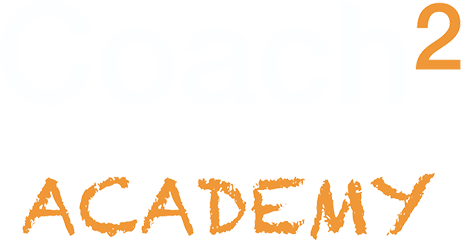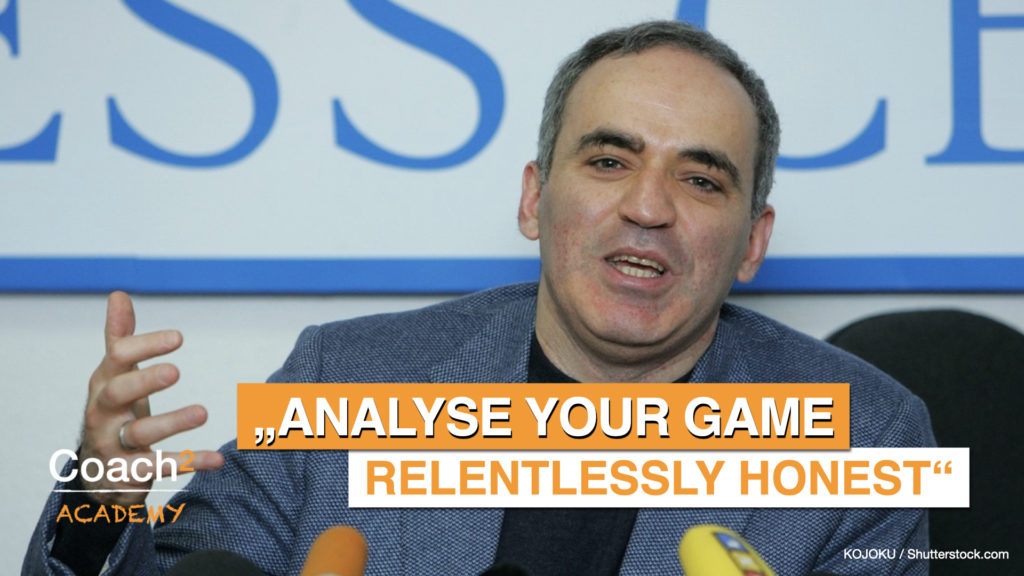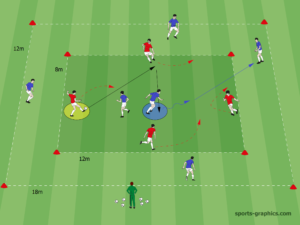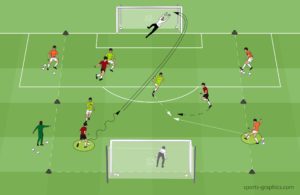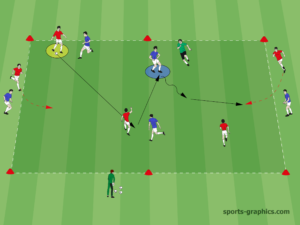Today in our look outside the box: Garry Kasparov. The Russian world chess champion grew up in the Azerbaijani SSR. From 1985 to 1993 he was the official world champion of the World Chess Federation FIDE. The grandmaster’s games against Anatoly Karpov, which made him the youngest world champion of all time, were legendary. He ended his career in 2005 and has been politically active ever since. Find out what you can learn from his career in this blog article.
“Play on a real chess board as often as possible”
Chess often takes place on the screen. Grandmasters play many games in parallel and click their way from victory to victory. Kasparov warns about reality: “In the analysis of some games I noticed that it makes a difference whether I play on the screen or have the board right in front of me. Just the angle at which I see the board can make a difference whether I can call up all the patterns and solutions or not. “
Learning for football: Training has to match the game as much as possible. If a chess grandmaster has a problem with the angle on the board, how are players supposed to play better on the weekend if they only pass from A to B during the week … (More on this in THIS older blog article)
“What is the most lethal threat?”
In chess, new decisions always have to be made. Every move leads to a new situation that offers new solutions. With the abundance of possible moves, it quickly becomes lost in smaller tactics and ideas. Kasparov gives the tip to first search the board for the “greatest threat” and to eliminate it. This possibility gives the player a clear strategy that he can use as a guide.
Learning for football: It goes without saying! 😉
„No matter you or your opponent is doing at the end of the day the game ends with the king”
– Garry Kasparov Tweet
“Escape the threat and create a bigger threat”
Even in chess you have to attack and defend cleverly. Kasparov was known for his great defenses. But he always had a different thought in mind: “It’s not enough to defend well. In addition to eliminating the greatest threat, I have always tried to attack and present a greater threat. “
Lessons learned for football: we often analyze an opponent and just think about how we can be able to “take this or that player out of the game”. But there is perhaps huge potential behind this, namely to attack via this greatest strength. Actually, an opponent has great self-confidence when he can use his strong principles and weapons. If this is exactly what is attacked, this damages self-confidence.
“Be comfortable with as much patterns as possible”
Actually self-explanatory: the more solutions and patterns the player has played in his head and also actively, the more he has ready when it comes down to it. Kasparov not only learned from his own games, but also studied his opponent, legendary games and the best solutions from computer calculations.
Learning for football: we trainers always have to remain a ‘student of the game’ and be on the lookout for new solutions. We can only help our players better if we keep creating or finding new solutions!

„Start with the Endgame“
In his book “How Life imitates Chess”, Kasparov describes numerous endgame scenarios (constellations with a few characters that seem clear at first and appear shortly before the end of the game). He describes that many games come to a head in these scenarios and that “those who are simply better at them will win more games.”
Learning for football: we have endgames like this too. It will often happen that we have 10 minutes left on the clock and the result is tight. But do we always know what exactly we have to do? Are we studying these “endgames”? Do we know which change can help our team? When analyzing your team and your own actions, focus specifically on these situations!
“Analyze your game relentlessly honest”
There is only one way to really get better: analyze yourself. We often lie in our pockets: “That wasn’t really a mistake, it fits”. One of the secrets of Kasparov’s success was the “brutally honest” analysis of his games
(Interesting: his first analysis of a game took place immediately after the game, “because the memory is fresh”, but he then waited a few days and returned to the analysis).
Only this kind of analysis leads one to find and fathom the “nature of one’s own faults”. He regards victories as particularly dangerous. The analyzes are then often less honest: the good feeling of victory makes us arrogant and does not allow us to admit our mistakes.
Learning for football: are we always brutally honest when analyzing the team and ourselves? Are we really after exploring and uncovering everything or are we hiding behind the good feeling of victory? How often do we look away just because it doesn’t feel good to look closely?
„If you don’t find your own mistakes your opponent will”
– Garry Kasparov Tweet

III The World’s Great Chess Games. Karpov – Kasparov. Game 16 – position after 40.
“Always compete against your own excellence”
In all analyzes of past games and potential opponents: Kasparov has learned the most from himself. He sees chess as an infinite process, regardless of victory or defeat, which gives him the opportunity to be creative. He got into the game with the prospect of getting better and better, or as he puts it: “If you compete against your own quality, you will never run out of opponents.”
Lessons learned for football: Of course we want to win all games and that has to be the case. Nevertheless, as trainers, we should focus on the process, principles and values, i.e. on things that can get infinitely better. Then we will never run out of things to work on either.
“Go when there is nothing left to prove”
In 2005 Kasparov finished his career as # 1 in the world. He felt that it was “the end of his journey”. And even if he was still the best in the world, it was time to “start a new journey without losing the love of the game”
Learning for football: we’ll leave that to you …
Share this article:
Follow us on social Media!
Our on demand Soccer Coaches Course!
Subscribe to our Newsletter & Get our first Lesson for free!
Get some of our Drills!
You may also like:

A Comprehensive Guide to Soccer Coach Education
As a soccer coach, you know the importance of education in the development of your players. You understand that their learning can help them become
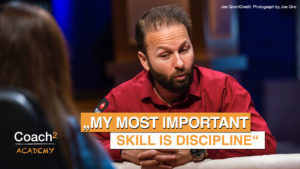
What Soccer Coaches can learn from Daniel Negreanu
Today we take a loo at Daniel Negreanu and what you as a Soccer Coach can learn from his career.

What Soccer Coaches can learn from Doc Rivers
This time we take a look at Doc River, the 2008 NBA Champion and what every Soccer Coach can learn from him
